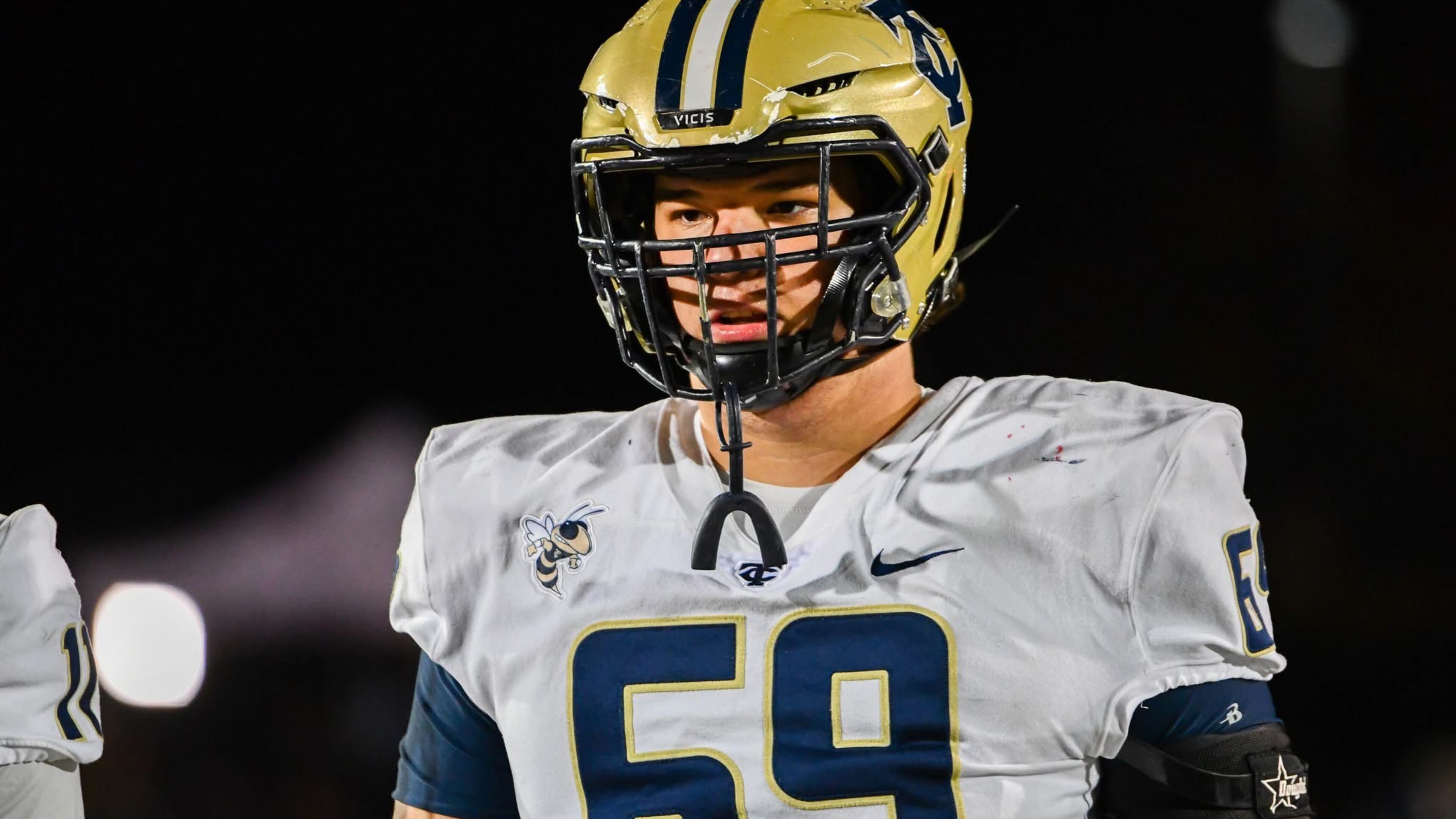He never played football in Russia. Moving to South Ga. hotbed made him a D-1 prospect.

Four years ago, Artem Korchagin was lying in a hospital bed in Moscow, unsure of what was happening to him.
At age 13, he was fighting off an allergic infection that had begun attacking his body. Surrounded by doctors and uncertainty, the world outside his hospital room was shifting, too.
His father, an industrial engineer, had just received word from his company that he was being transferred — not to another Russian city, but more than 5,000 miles away, to a small town in Georgia. Not the country, but the state.
Shortly after, Korchagin was out of the hospital, healthy again, and a year later, moving to the football hotbed of Thomasville.
“I felt great,” Korchagin said, remembering when he first heard the news. “At first, I was like, ‘Nah, he’s just saying it to make me feel better.’”
Today, Korchagin is a 6-foot-4, 315-pound offensive lineman committed to California, where he’ll be playing football, a sport he hardly knew, much less dreamed of playing, until coming to the United States.
Back in Russia, Korchagin had planned to finish high school, attend a military college and become an officer. But Korchagin wanted to come to America and experience what it had to offer, so the hospital news did cheer him up, but it was always just a dream.
“You never think it’s going to be real,” he said.
When Korchagin first touched American soil, it was for a few hours in Miami, a city buzzing with energy, color and sound unlike anything he’d ever known. Its culture was a swirl of languages and accents, full of slang his Russian classrooms never covered.
“I spoke the English they teach in Russia,” he said, “but people here talked with slang. I was like, ‘You sure you speak English?’”
Korchagin enrolled at Thomas County Central. As a 14-year-old freshman — already standing close to 6 feet, 2 inches and more than 300 pounds, but out of shape — he was drawing attention without saying a word.
Football coach Justin Rogers had recently taken over a struggling Yellow Jackets program after a stint at Colquitt County. In a school and town where football runs deep, it didn’t take long for word of the new kid to reach him.
It came from Korchagin’s English teacher, Laura Parkerson. She’d been telling Rogers about this quiet, towering student in her class. Within days, she walked Korchagin down the hall and into Rogers’ office, a simple act that would alter his life.
Rogers told him he should come out and try football. Rogers said something that stuck with him: “You have the opportunity to go somewhere.”
Korchagin didn’t yet know what that meant.
“Well, I just started going with (the) freshman team,” Korchagin said. “I didn’t know anything. I was just over there having fun.”
But it wasn’t easy.
“It was hard, really hard, because I’ve never played anything like that,” said Korchagin, who had been a boxer, swimmer and hockey player as a child in Russia. “It’s so confusing, to the point where you don’t know the purpose of the game. Like, what’s your goal as a player?”
He said it sometimes felt a little embarrassing. Because of his size, people expected more from him.
At home, it was a battle of a different kind. He didn’t come from a sports family, and when his father found out he was playing football, he wasn’t on board.
“He knew that it (was) a very dangerous sport to play,” Korchagin said. “But then I got into it, and he saw that I really enjoyed it.”
His dad started coming to a few practices. He watched how the game worked, how the players moved and how the coaches taught. Slowly, he came around.
But freshman year was still tough.
“I had a lot of school stuff I had to figure out first,” Korchagin said. “Like, English, how to speak to people, and when we got done with football after school (after freshman football season ended), it became something that, I’m going to do it but later.”
Korchagin began playing as a defensive lineman. Everything he learned during his freshman year — how to get off blocks, plug gaps and chase the quarterback — came from playing defense. But that spring, the coaches moved him to the offensive line.
New position. New stance. New techniques. New formations. Starting over, again.
This time, though, football was at the forefront.
“I started with learning the playbook,” Korchagin said. “I felt like we have a lot of people, in general in football, that don’t care about your playbook. They are going to come over and say, ‘Yeah, I know what to do,’ but they don’t really know what to do.”
That summer, coaches moved him again, from right guard to center.
“That kind of messed me up a little bit,” Korchagin said.
The center often is the brain of the offensive line, the communicator who makes the calls. The center makes sure every lineman knows the blocking scheme. And on many plays, it’s up to the center to decide what’s right — in real time, with real consequences.
“Coaches thought that I would be a good leader for some reason,” Korchagin said. “I didn’t really think (so) because at the time, I just wasn’t that good. I was a quiet guy. But in the end, they really were right because I became the leader that I am right now.”
The move to center didn’t just change how he played the game, it changed how he spoke it. Korchagin credits the position’s communication demands as the biggest factor in improving his English.
By his sophomore year, he began to prove to his coaches, his teammates and, most important, to himself that he could play the game.
“You would have to run him out of there,” Rogers said. “He was going to try to play every snap he could possibly play. He was always so intelligent (and tried) to learn more than just his job.”
That season, Korchagin also picked up a couple of nicknames, “Big Rush” and “Russki,” the latter given by an assistant coach with Polish roots. Ruski means “Russian” in Russian.
Korchagin’s arrival in Thomasville also corresponds to one of Georgia football’s more notable recent turnarounds. The team was 5-6 in 2021, the season before Korchagin and Rogers arrived. In 2022, it went 12-1 while Korchagin was playing on on the freshman team, then 15-0 the next year, winning its first state title since 1997 while Korchagin was on the JV squad and scout team.
Though he did not play, Korchagin dressed out for Thomas County Central’s 2023 championship game in Mercedes-Benz Stadium. He said watching high school athletes play in an NFL stadium was a turning point in his father’s perception of his son’s new sport.
“It was crazy because you know I’ve played some sports in Russia, but I’ve never had a chance to play in front of a big crowd,” he said. “In Russia, it was more of, like, just parents of players, and here you pull up to the stadium and there’s a couple thousands of people watching you.”
In Korchagin’s first season as a starter, Thomas Central was 11-2. He made first-team all-Region 2-5A, one of the state’s toughest regions. He helped anchor a running attack that piled up 2,680 rushing yards and averaged 7 yards per carry.
As Rogers predicted, college coaches began to take notice.
Korchagin and his family began looking for a school that combined strong academics with opportunity on the field. Duke first caught his eye, but then Cal came into the picture.
Korchagin said Cal was aggressive in its recruitment and made him feel wanted. In April, he gave a commitment to play for the Golden Bears. He credits Cal offensive line coach Famika Anae for pulling him emotionally away from Duke.
“Just the way he positions himself when he talks to you, the experience that he has,” Korchagin said. “When he talks to you, you can really feel that he has a respect for you. Some people will say that, but they’re not going to really mean it, but when he says something, he really, really means it.”
The move across the country doesn’t faze him. It’s only 2,500 miles to Berkeley, nothing like Moscow to Thomasville.
His family, once unsure of the sport, now stands behind him. They understand that football is more than just a game; it’s a path forward.
“They are OK because they understand that not everybody gets the opportunity I have right now,” Korchagin said. “I have to (make) the most out of that opportunity. It really doesn’t matter where it is — California, Alaska, Hawaii or wherever — if I have an opportunity to go to school for free (and) play football and I really want it, they’re OK with that.”
Next summer, Big Rush will board a plane to California, chasing a future that once felt impossible from a Moscow hospital bed.

